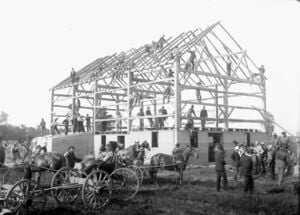
Together we are stronger. Together we are kinder. Together we have colours.
If we're wanting to envision what a CAN of CANs might be like, beyond or perhaps as well as noticing how they might already manifest, what might help inform such a vision?
Below is a list of short (500 - 800 word) articles from the The future we deserve, which although written roughly a decade ago still seem relevant, with a brief extract or introductory comment, and a link to the full article. (Alternatively hover your curser over the link for a brief preview of how the article starts)
Working Together: Unleashing Collective Intelligence[edit | edit source]
by Fabio Barone, full article 8 paragraphs, access here
We are witnessing something unprecedented. We are observing how people are taking initiatives and creating the world they want to see. We are seeing how the Internet allows us to connect peers and empower individuals. We want to co-create, to engage with people and projects no matter where they are, we are drawn to collaborate, co-design, form communities, and imbue our actions with meaning and values. Are we headed towards a global collective intelligence, coagulating our endeavours to form one single big organization, with the Internet being something like the nervous system?
Getting The Future We Deserve[edit | edit source]
by Paul Graham Raven, full article 11 paragraphs, access here
I'm going to go out on a limb, here: yes, it is our fault that they don't deliver. It's our fault because we're so eager to palm off that responsibility onto a broken system, despite a clear history of lies, deceit and (most commonly) incompetence. Look: if you were fielding tenders for some big outsourced project, and one of the pitches came from an organisation with a track record of failures-to-deliver like that of your government, would you hire them, even if they lowballed the hell out of their bid?
Of course you wouldn't. Because you're not an idiot.
We Deserve to Evolve[edit | edit source]
by Sam Rose, full article 6 paragraphs, access here
Sharing is the key missing dynamic in human activities worldwide. Sharing economies give people alternatives to market economies. World-wide, humans desperately need to dramatically increase the volume of voluntary sharing taking place among people, especially in relation to basic needs like food, water, energy, physical production, access to information. Sharing resources formally and perpetually is plausibly the fastest route to bringing human activity back to within the carrying capacity of the planet.
The Future is Here[edit | edit source]
by Kenneth Lo, full article 35 paragraphs, access here
You start with what you know, with where you are. Unfortunately, these two may not coincide. Many of us no longer have much of a relationship with the natural world around us.
Somewhat like politics, all successful conservation is local.
Collaboration for Introverts or, How to Make Friends and Tolerate People[edit | edit source]
by Steve Wheeler and Alex Fradera, full article 27 paragraphs, access here
E: It's a vicious cycle, isn't it? I worry that we've edged towards apartheid, with introverted thinkers inhabiting the abstracted spaces and extroverts dominating the actively social ones. One issue is that most extroverts don't really understand that introverts have a different style of thinking and interacting. They think they are just uninterested or have nothing to say.
The Future We Got–Earth Date Zero Plus Twenty[edit | edit source]
by Pamela Mclean, full article 9 paragraphs, access here
So now it's Earth Date Twenty, and time to take stock. We confluence; we flow together; we swarm; we flock; we are individual but connected; we group together while interests and objectives overlap; we separate out again, go different ways, and regroup. In a way it is more chaotic, but it is also much more effective – and sustainable. Technology has moved on and we have things that people a couple of decades ago could hardly have imagined, and yet somehow, exactly twenty years ago, that critical mass of people did get the vision and make the shift.
New Public Thinking (2011) / Creative and collaborative[edit | edit source]
by Tessy Britton, full article 17 paragraphs, access here
This same pattern is appearing all over the place, through community fruit collections, skill sharing, resource sharing and tons of projects relating to food - growing, cooking, making and learning - and what we are seeing is culturally very different from what we have witnessed before. Knowledge about systems, the social needs of people, the ideas and methods of making these social projects successful, is slowly becoming more widespread. Professionals are deploying their expertise in their own communities voluntarily. There is a much deeper and wider appreciation of the idea of waste, the current waste of people's talents, ideas and energies, as well as the physical resources lying empty. Collectively, these different strands of thinking represent opportunities to act in clever and successful ways that have the potential to transform how we live day-to-day.
Document:Holarchic Noosphere Example.odt[edit | edit source]
by User:SteveWheeler, full article 46 paragraphs, access here
Text or listing via a 2 col table, so perhaps might not seem an easy or flowing read, but packed full of creative ideas or questions. (Noosphere W)